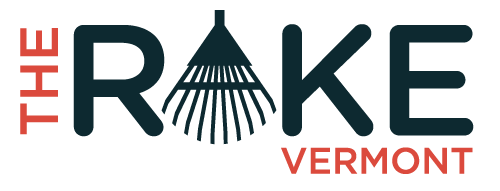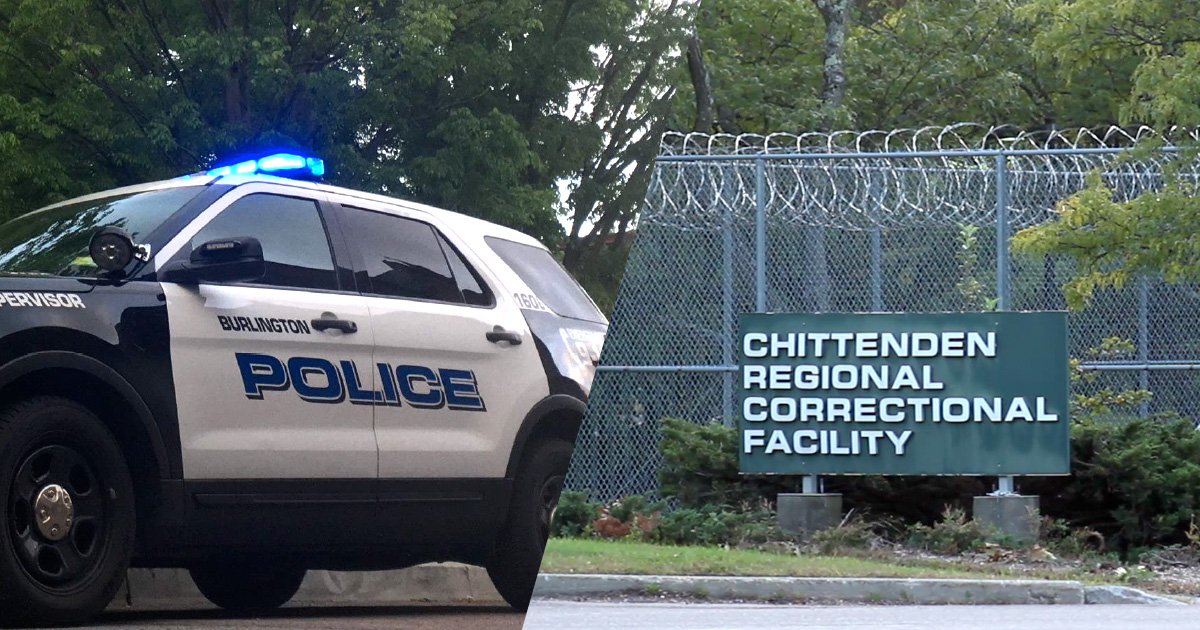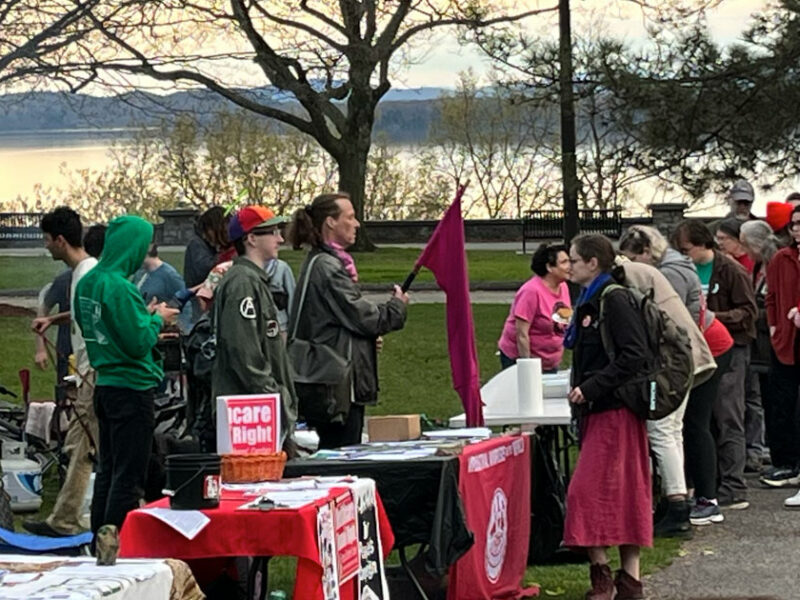On Tuesday evening, January 24, dozens of local activists and organizers met at the Fletcher Free Library in Burlington to condemn the push for more funding of police and prisons from the state and the city of Burlington. They highlighted non-carceral strategies to create safer, healthier communities with less violence. The event was sponsored by FreeHer Vermont, Howard Center workers in AFSCME Local 1674, People for Police Accountability, and Tempest Collective.
After years of controversy over what will become of Vermont’s run-down women’s prison, the Chittenden Regional Correctional Facility, the state has contracted with the HOK design firm, moving forward with the firm’s “Option C” proposal. With an estimated cost of $252 million, this will build or expand four prison facilities with capacity to incarcerate 894 Vermonters in total.
Despite consistent calls by community members to divert money from policing and invest in services, the city council’s now-reversed decision to reduce the police force by 30% through attrition has not resulted in a reduction in police funding: money has not been removed from the police force in order to fund outside services. Rather, funding has been rerouted within BPD, as new community service officers (CSOs) and community support liaisons (CSLs) work within the department.
While introducing unarmed officers and police department social workers may lead to fewer incidents of excessive force, this is a far cry from investment in measures that would promote community health. Furthermore, Vermont lacks effective accountability measures for police misconduct.
Systemic Violence, Community Struggle
Paul Fleckenstein, a longtime local activist and member of Tempest Collective, an online socialist media group, opened the meeting by laying out how capitalism creates “a particular social order, organized around profit” that relies heavily on violence to control oppressed groups and undermine community solidarity.
This violence can take the form of austerity, slashing funding for “housing, culture, recreation, welfare, education, urban development, health care, children, and public sector union jobs.” The result has been rampant inequality over the past 50 years of neoliberal policy.
While we have seen a dramatic drop in supportive community funding since the 1970s, Fleckenstein pointed out that the relative funding for policing and prison construction has been “enormous.”
In the face of such violence, the abolition movement “calls the whole social order into question, which is one of the reasons that the backlash [since 2020] has been so strong.” During the summer of George Floyd protests, for example, there were more than 20,000 arrests and thousands of injuries at the hands of police as millions of protesters took to the streets. In Vermont and elsewhere, the police and media have painted a picture of crime waves resulting from defunding the police, despite crime rates remaining historically low and police budgets remaining historically high.
Policing has not changed; police still kill one person every eight hours in the United States, with thousands more reported acts of police brutality and misconduct.
In setting the stage for the rest of the speakers, Fleckenstein highlighted the importance of more struggle, less focus on elections, and consistent dedication to building organizations that will fight effectively to disrupt capitalist systems “with a radical horizon toward a multiracial class struggle challenging the status quo and toward a different kind of world.”
“Community Healing without Violence”
For Jayna Ahsaf, abolition is about building safe communities and getting rid of systems that are oppressive by design. “We do not believe these systems can be reformed. We believe prisons and police systems were designed to do exactly what they’re doing today, which is to oppress and control us.” Ahsaf is a member of FreeHer Vermont, part of The National Council for Incarcerated and Formerly Incarcerated Women and Girls, which aims to end incarceration for women and girls.
The state spends over $168 million annually on prisons. “It’s just sending a really big message about our state’s priorities for our future,” Ahsaf said, “because these prisons won’t just incarcerate us, they’ll incarcerate our children and grandchildren.”
Ahsaf explained how prisons fail to protect communities, citing that Vermont’s recidivism rate hovers around 52.5% in part because of the lack of support for formerly incarcerated Vermonters. “Many community groups that are doing alternative work or reentry work actually have to receive their funding from the Department of Corrections because there’s not enough allocated in our general budget for those services.” Prisons, Ahsaf said, are a revolving door that perpetuate further trauma and harm to our communities.
When describing the alternatives to incarceration, Ahsaf mentioned community-based settings with wraparound services. In addition, she stressed the importance of prevention through meeting the needs of all members of society and creating infrastructure for navigating conflict “independent of state intervention.”
Of extreme cases in which people do need to be removed from the community, Ahsaf said, “There’s only around like twenty folks [in the state] that really need long term supportive care, and we think that can be done in a facility that doesn’t have to look like or be a prison.”
For an example of successful justice reform, Ahsaf turned to juvenile justice reform in Hawaii, which recently led to bringing the population of incarcerated girls down to zero through implementing community-based solutions.
Some of FreeHer Vermont’s current goals include a prison moratorium bill, an elder parole bill, providing basic income for people upon reentry, and establishing a participatory defense hub in 2023.
“Workers will need to lead”
Andy Blanchet, president of AFSCME Local 1674, which represents Howard Center workers, spoke on the state’s chronic underfunding of essential social services. They highlighted the importance of unionized social service agencies for the power of collective bargaining so that service workers can work toward meeting the needs of the community.
This lack of funding, Blanchet said, created a cycle in which agencies can’t provide adequate infrastructure or resources needed to support workers or the communities served. As a result, service workers face burnout and turnover, which leads to community members not having their needs met adequately. This in turn adds pressure on the system and creates more demand for social services, continuing the cycle.
Workers like Blanchet are spread thin. “Meanwhile, social workers see the police continue to get increased funding and see plans for a new prison to be created out of the manufactured fear in the community regarding crime,” they pointed out. “It is a slap in the face.”
Workers in social services are told that their low pay is balanced out by the fact that they’re making a difference. Blanchet said this hero narrative is a way to divide underpaid workers.
Despite the clear failures of the system, workers and communities are encouraged to support the carceral state, as those in power “would rather create the appearance of safety and rehabilitation for the white liberal than actually divest from the root causes of crime and harm, which is capitalism,” Blanchet said.
In addition to highlighting the importance of organizing workers to move toward goals of creating new systems, Blanchet pointed out that within Vermont’s designated agencies, like the Howard Center, the loudest voices and those making the decisions are often “wealthy white people, the same people who buy into the illusion of safety and rehabilitation provided by the carceral systems.” In 2021, former Burlington Police Chief Brandon del Pozo stepped down from his role on the Howard Center Board of Trustees following an investigation, the results of which were never made public, into misconduct in targeting a local activist and Howard Center employee.
Blanchet closed by saying that while workers must lead the push away from these systems, it’s important to include and prioritize the voices of groups like Green Mountain Self Advocates in discussions of labor and community building.
Accountability Short-Term, Thriving Communities Long-Term
After previous speakers presented a broad picture of abolition work, Jess Laporte of People for Police Accountability closed the panel by discussing the Community Control of Police charter change proposal in Burlington.
Currently, the Burlington Police Chief has the sole authority to make disciplinary decisions regarding officer misconduct. The charter change would create an independent Community Control Board and give it authority to hire, fire, and discipline police officers. This board would be adequately representative of the community it serves, would have full investigatory power of the police department, and would operate with transparency.
This substantial authority is what separates the Community Control Board from the Police Commission, which has a purely advisory role to the police department.
Laporte wanted to be clear that the charter change proposal is not an alternative to policing, nor does it defund BPD. “It acknowledges that policing exists in our city. And in our current political climate, our city is not ready to move beyond policing.”
Laporte went on to describe that even with this limited scope, forcing police to operate within an accountability system is itself a threat to the system, which is why the ballot measure is being met with significant backlash.
“In order to fight Community Control of Police, the police department and the mayor collude to create a situation in which residents feel less safe and where they aren’t even offering the service that they’re supposed to offer,” she said.
Laporte sees the opportunity to give our community the ability to track police misconduct as a way forward in building support of abolition. “This body would be able to field these cases of misconduct, and I believe that will allow us to have a more full narrative about the level and extent of misconduct in policing in Burlington.”
Again, Laporte stressed that if activists must engage with the political system, they must do so strategically. She says the Community Control of Police is one opportunity to give significant power to the community. “Within the political system, they say, ‘But show us the data.’ So I’m like, great, here’s a mechanism where we could actually have a more full picture.”
While limiting police power is a necessary step given our current political climate, Laporte emphasized the importance of creating thriving communities. She pointed to the Vermont Releaf Collective’s work to build networks that support racial equity and justice in Vermont’s land, environment, agriculture, and foodways.
To build support for the ballot measure, Laporte has practical advice: “In 2020, everyone was saying, ‘Talk to your racist family member.’ I want to ask the people in this room to talk to the moderate middle in your life, your supervisor at work, your coworker, your neighbor, who you sometimes get in issues with at the condo association, to the everyday modern middle that we swim in every day.”
Burlington voters can head to the polls on March 7; mail-in voting starts February 15.



